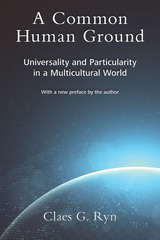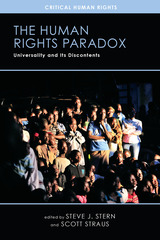2 books about Universality

A Common Human Ground
Universality and Particularity in a Multicultural World
Claes G. Ryn
University of Missouri Press, 2019
A great challenge of the twenty-first century is the danger of conflict between persons, peoples, and cultures, among and within societies. In A Common Human Ground, Claes Ryn explores the nature of this problem and sets forth a theory about what is necessary for peaceful relations to be possible.
Many in the Western world trust in “democracy,” “capitalism,” “liberal tolerance,” “scientific progress,” or “general enlightenment” to handle this problem. Although each of these, properly defined, may contribute toward alleviating disputes, Ryn argues that the problem is much more complex and demanding than is usually recognized. He reasons that, most fundamentally, good relations among individuals and nations have moral and cultural preconditions.
What can predispose them to mutual respect and peace? One Western philosophical tradition, for which Plato set the pattern, maintains that the only way to genuine unity is for historical diversity to yield to universality. The implication of this view for a multicultural world would be a peace that requires that cultural distinctiveness be effaced as far as possible and replaced with a universal culture. A very different Western philosophical tradition denies the existence of universality altogether. It is represented today by postmodernist multiculturalism—a view that leaves unanswered the question as to how conflict between diverse groups might be averted.
Ryn questions both of these traditions, arguing for the potential union of universality and particularity. He contends that the two need not be enemies, but in fact need each other. Cultivating individual and national particularities is potentially compatible with strengthening and enriching our common humanity. This volume embraces the notion of universality, while at the same time historicizing it.
Using wide-ranging examples, Ryn presents a firmly sustained and systematic argument centering on this central issue. His approach is interdisciplinary, discussing not only political ideas, but also fiction, drama, and other arts. Scholarly and philosophical, but not specialized, this book will appeal to general readers as well as intellectuals.
[more]

The Human Rights Paradox
Universality and Its Discontents
Edited by Steve J. Stern and Scott Straus
University of Wisconsin Press, 2014
Human rights are paradoxical. Advocates across the world invoke the idea that such rights belong to all people, no matter who or where they are. But since humans can only realize their rights in particular places, human rights are both always and never universal.
The Human Rights Paradox is the first book to fully embrace this contradiction and reframe human rights as history, contemporary social advocacy, and future prospect. In case studies that span Africa, Latin America, South and Southeast Asia, and the United States, contributors carefully illuminate how social actors create the imperative of human rights through relationships whose entanglements of the global and the local are so profound that one cannot exist apart from the other. These chapters provocatively analyze emerging twenty-first-century horizons of human rights—on one hand, the simultaneous promise and peril of global rights activism through social media, and on the other, the force of intergenerational rights linked to environmental concerns that are both local and global. Taken together, they demonstrate how local struggles and realities transform classic human rights concepts, including “victim,” “truth,” and “justice.”
Edited by Steve J. Stern and Scott Straus, The Human Rights Paradox enables us to consider the consequences—for history, social analysis, politics, and advocacy—of understanding that human rights belong both to “humanity” as abstraction as well as to specific people rooted in particular locales.
The Human Rights Paradox is the first book to fully embrace this contradiction and reframe human rights as history, contemporary social advocacy, and future prospect. In case studies that span Africa, Latin America, South and Southeast Asia, and the United States, contributors carefully illuminate how social actors create the imperative of human rights through relationships whose entanglements of the global and the local are so profound that one cannot exist apart from the other. These chapters provocatively analyze emerging twenty-first-century horizons of human rights—on one hand, the simultaneous promise and peril of global rights activism through social media, and on the other, the force of intergenerational rights linked to environmental concerns that are both local and global. Taken together, they demonstrate how local struggles and realities transform classic human rights concepts, including “victim,” “truth,” and “justice.”
Edited by Steve J. Stern and Scott Straus, The Human Rights Paradox enables us to consider the consequences—for history, social analysis, politics, and advocacy—of understanding that human rights belong both to “humanity” as abstraction as well as to specific people rooted in particular locales.
[more]
READERS
Browse our collection.
PUBLISHERS
See BiblioVault's publisher services.
STUDENT SERVICES
Files for college accessibility offices.
UChicago Accessibility Resources
home | accessibility | search | about | contact us
BiblioVault ® 2001 - 2025
The University of Chicago Press









